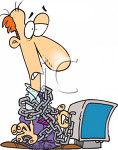
My entry on Computer Game and Internet Addiction: The Emergence of a New Clinical Disorder caught the interest of a Health Magazine in the Philippines and published a similar article a few months later.
Take a look at the latest findings from American, Canadian and British doctors.
From this article, Recognize Internet addiction as a mental illness, MD urges, compulsive e-mailing and text messaging could soon become classified as an official brain illness.
An editorial in this month’s issue of the American Journal of Psychiatry says Internet addiction — including “excessive gaming, sexual pre-occupations and e-mail/text messaging” — is a common compulsive-impulsive disorder that should be added to psychiatry’s official guidebook of mental disorders.
British psychiatrists, reporting last year in the journal Advances in Psychiatric Treatment, say a “significant minority” — some estimate between five and 10 per cent of online users — are addicted to the Internet, and that while early research suggests most are highly educated, highly introverted males, more recent studies suggest the bulk of the problem is occurring among middle-aged women on home computers.
Computer use becomes problematic when the behavior starts affecting people’s lives. That’s according to addiction therapist John Macdonald, of the Centre for Addiction and Mental Health in Toronto.
Computer users use the internet like they would drugs or alcohol as a way to escape reality, the researchers say. Addicts may turn out to be addicted to everything from the sheer act of typing, to chat rooms, online shopping or three-dimensional, multiplayer games users have described as “heroinware.”
Whenever I am at the malls and pass by internet cafes, I spot kids playing with their peers. Is that harmful? As parents, we want to know the limits of computer use. How can a parent become vigilant?
Research into Internet addiction is in its infancy stage. We naturally wonder how doctors decide when computer use crosses the line from the normal to the pathological.
According to addiction therapist John Macdonald, of the Centre for Addiction and Mental Health in Toronto, computer use becomes problematic when the behavior starts affecting people’s lives.
For example, is the person pre-occupied with getting, and staying, online? “If they’re not able to engage in it, is it emotionally upsetting for them?
“The real proof in the pudding: is the amount that you do causing any problems in your life?” Mr. Macdonald says.
I believe children can be taught the wise use of the computer as early as 6 years old and that parents should be firm with their discipline towards the welfare of their children’s educational growth.
just like how that Korean gamer died from playing for 3 days! how terrible.
Great post. I recently wrote a post to help people dealing with addictions. Be sure to check it out and get the monkey off your back! Cheers, Chris
i work in an internet company, and i’m online minimum of 8 hrs. does that mean addiction to a lot of professionals? maybe not. for a child, that’s a different story. that means less time playing outside with friends, less time doing kids stuff. it does take away ones childhood.
i’m also a gamer, i’ve had friends who dropped out of school because of the consequences of too much gaming.
i love technology, it’s just up to us to have enough self-discipline to stop it from eating us alive.
Pingback: The Pinoy Blogosphere Weekend Recap (03/23/08) | PinoyBlogero.com
Pingback: The Pinoy Blogosphere Weekend Recap (03/23/08) by The Philippines According to Blogs
Pingback: links for 2008-03-23 « PinoyBlurker @ PinoyBlogoSphere.com
Pingback: Pinoy Blurker » links for 2008-03-23
Computer users use the internet like they would drugs or alcohol as a way to escape reality, the researchers say. Addicts may turn out to be addicted to everything from the sheer act of typing, to chat rooms,
This is true. Someone even told me that she noticed that the main reason why I have a few friends is because of my addiction to the internet. Oh well.
Hi Tita Noemi. I am Mica the girl who went to the wiki event with tita dine 🙂 take care po 🙂
what if that addiction(maybe not called addiction) makes you learn something out of it?Like me, i like to play net games but at the same time learning, ive proven that. Im relating what i learn in these games(believe me its true) to my other classes in school.
But its totally true that it is an addiction but its just a matter of how you use that addiction
I would like to inquire if there is a clinic in Manila or any part of the Phil. that would cure computer addiction. I already considered my son to be a computer addict he has enrolled in may colleges and universities and he always quit school just to play computer games. Please help me find a clinic that could cure him. Thank you.
I just want to be in control of those days. ,
Question is he allowed to work out at all? ,